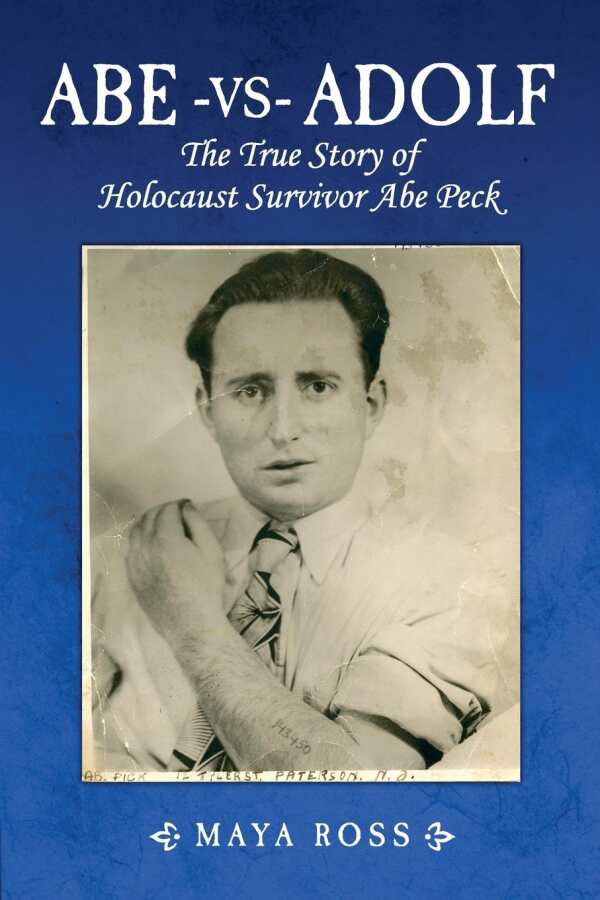Abe-vs-Adolf
The True Story of Holocaust Survivor Abe Peck
In Abe-vs.-Adolf, Maya Ross and Abe Peck speak powerfully for the voiceless millions whose stories will never be told.
In the early morning of April 30, 1945, an American tank plowed through the entrance of the Allach concentration camp, ripping through barbed wire fences to liberate the prisoners. One of them, Abe Peck, had spent over five years in nine different Nazi concentration camps. His story, as told in Maya Ross’s Abe-vs.-Adolf: The True Story of Holocaust Survivor Abe Peck, is fraught with the chilling truth that “our fate hinges on learning from our past.”
Peck (originally Pik) was born in Szadek, Poland, in 1924. Living conditions in the town were primitive by today’s standards, yet Peck’s childhood was happy. His parents were intellectuals who, while not religious, celebrated Jewish holidays and honored Jewish traditions, teaching them to their children.
But prejudice against the Jews was deeply embedded in Polish society. Peck remembers how Jewish children were tormented and beaten at school and how Poland’s Jews had no legal protections. Education for Jewish children was limited, so the Jews started their own colleges and universities. But things were about to get much worse. Hitler’s speeches and the newspapers brought word of actions being taken against the Jews in Germany, and Polish anti-Semitism paved the way for the Germans to extend their campaign to eradicate Polish Jews as well.
Peck was just fifteen when he, his family, and the rest of Szadek’s Jews were forced into a ghetto. “Abe lived with his parents, sister and five other families under deplorable conditions, crammed into a small single-family home,” writes Ross. There was no bathroom, no furniture, and no medical care; many died of disease and starvation. Peck spent the next five years of his life living in concentration camps, doing slave labor in mines, spreading the ashes of dead Jews over fields, and enduring death marches.
But nothing broke his spirit; he had decided to wage his own personal war with Hitler. It was a war with high stakes: if he survived, he had defeated Hitler, if not, then Hitler had the victory. Peck not only survived, but, after immigrating with his wife and son to the United States, rose up to become a very successful businessman and philanthropist.
Ross’s powerful and moving narrative gives insight into how Germany, known for its scientific and technological innovations and considered the most westernized, progressive, enlightened, and liberal country in Europe, came to commit unthinkable atrocities. She and Peck reveal both a time of unimaginable horrors and the hearts of those who faced them with courage.
The material in the book is graphic and disturbing, and includes numerous black-and-white photographs of emaciated prisoners, their horrendous living conditions, and the bodies of the dead. Ross brings Peck’s story to life with vivid descriptions, sensitive handling of emotions, and lots of direct quotes from Peck, who also is a fine storyteller.
The narrative’s brisk pacing makes for an intense and memorable reading experience. The interior design and layout of the text are easy on the eye and the photographs included are clear and well organized. Explanatory footnotes, the timeline of events in Peck’s life, and a glossary of foreign terms add depth to the knowledge the book provides.
Now over ninety, Peck continues to tell the world about the horrors he both experienced and witnessed, countering those spreading the lie that the Holocaust never happened. In Abe-vs.-Adolf, Maya Ross and Abe Peck speak powerfully for the voiceless millions whose stories will never be told.
Reviewed by
Kristine Morris
Disclosure: This article is not an endorsement, but a review. The publisher of this book provided free copies of the book and paid a small fee to have their book reviewed by a professional reviewer. Foreword Reviews and Clarion Reviews make no guarantee that the publisher will receive a positive review. Foreword Magazine, Inc. is disclosing this in accordance with the Federal Trade Commission’s 16 CFR, Part 255.


